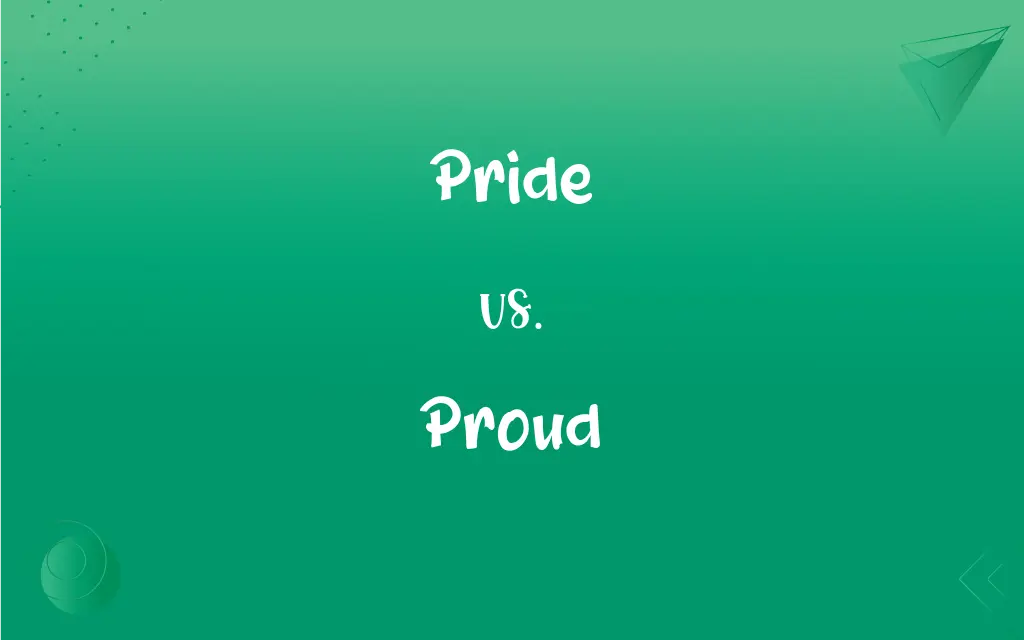Pride vs. Proud: What's the Difference?
Edited by Aimie Carlson || By Janet White || Published on December 11, 2023
"Pride" is a noun denoting a feeling of satisfaction or achievement, while "proud" is an adjective describing the state of feeling this satisfaction.

Key Differences
"Pride" is used as a noun to refer to a sense of self-respect or pleasure derived from achievements. While, "proud" is an adjective describing someone who feels this emotion.
Pride can encompass a broader range of feelings, from personal achievement to collective success. Being proud often relates to personal feelings about one's own or others' accomplishments.
Pride is often expressed or perceived as a trait or feeling, potentially positive or negative. Proud is used to describe an individual's emotional state, generally positive.
In a sentence, "pride" functions as a noun, representing the concept of the emotion. "Proud," as an adjective, modifies nouns and pronouns, indicating the presence of this emotion.
"Pride" can be used in various contexts, from individual pride to group or national pride. The use of "proud" is more personal, often directly relating to the speaker or the subject of a sentence.
ADVERTISEMENT
Comparison Chart
Part of Speech
Noun
Adjective
Emotional Range
Broad, can be personal or collective
Personal, directly related to an individual
Usage in a Sentence
As a subject or object
To describe or modify a noun/pronoun
Connotations
Can be positive or negative, depending on context
Generally positive, expressing satisfaction
Variability
Used in diverse contexts
More specific, relating to personal feelings
ADVERTISEMENT
Pride and Proud Definitions
Pride
A feeling of satisfaction from one's own achievements.
Her pride in her academic achievements was evident.
Proud
Feeling pleased about someone's achievements or one's own.
She was proud of her team's performance.
Pride
A feeling of pleasure from someone else's achievements.
His parents' pride in his music was immense.
Proud
Having a high opinion of oneself; dignified.
He was too proud to admit his mistake.
Pride
A group of lions.
A pride of lions roamed the savannah.
Proud
Reflecting a high standard or quality.
The architect was proud of the building's design.
Pride
The confidence and self-respect expressed by members of a group, typically one that is marginalized.
Pride Month celebrates LGBTQ+ community pride.
Proud
Arrogant or haughty.
She came across as proud and unapproachable.
Pride
Excessive self-esteem; conceit.
His pride led to his downfall.
Proud
Feeling satisfaction due to something one associates with.
They were proud to be part of the organization.
Pride
A sense of one's own proper dignity or value; self-respect.
Proud
Feeling pleasurable satisfaction over an act, possession, quality, or relationship by which one measures one's stature or self-worth
Proud of one's child.
Proud to serve one's country.
Pride
Pleasure or satisfaction taken in an achievement, possession, or association
Parental pride.
FAQs
What does it mean to be proud?
Being proud means feeling deep satisfaction or pleasure over something deemed worthy of esteem.
Is being proud always positive?
Mostly, but excessive pride can be perceived negatively.
Can pride refer to a group feeling?
Yes, pride can describe a collective feeling of self-esteem and dignity among a group.
What does pride mean?
Pride refers to a feeling of satisfaction or pleasure from one’s own achievements, qualities, or possessions.
Can someone feel proud on behalf of others?
Yes, it's common to feel proud for someone else’s achievements or qualities.
Can pride be negative?
Yes, excessive pride can be seen as arrogance or egotism.
Is pride an emotion?
Yes, pride is considered an emotion related to one's self-esteem.
Is being proud a temporary state?
Feeling proud can be both a temporary response to an achievement and a lasting sense of self-worth.
Can pride motivate people?
Definitely, pride can be a powerful motivator for personal achievements.
Is pride linked to self-respect?
Yes, pride is often associated with self-respect and dignity.
Is pride always personal?
No, pride can be personal or shared among a group.
Can pride lead to conflict?
Excessive pride or pride based on superiority can lead to conflicts.
Can pride be a sense of identity?
Yes, people often take pride in their identity, heritage, or community.
How is pride used in LGBTQ+ contexts?
In LGBTQ+ contexts, pride represents dignity and self-affirmation.
Is being proud necessary for self-confidence?
While not necessary, feeling proud can significantly boost self-confidence.
Does pride have cultural variations?
Yes, expressions and perceptions of pride vary across different cultures.
Can one be proud of someone else's heritage?
It's more common to respect others' heritage, but one can feel proud of another's achievements related to their heritage.
Can animals exhibit pride?
Some animal behaviors might be interpreted as pride, but it's primarily a human emotion.
Does pride relate to accomplishments or qualities?
Pride can relate to both accomplishments and inherent qualities.
How do cultures celebrate pride?
Cultures celebrate pride in various ways, often through ceremonies, festivals, or public affirmations.
About Author
Written by
Janet WhiteJanet White has been an esteemed writer and blogger for Difference Wiki. Holding a Master's degree in Science and Medical Journalism from the prestigious Boston University, she has consistently demonstrated her expertise and passion for her field. When she's not immersed in her work, Janet relishes her time exercising, delving into a good book, and cherishing moments with friends and family.
Edited by
Aimie CarlsonAimie Carlson, holding a master's degree in English literature, is a fervent English language enthusiast. She lends her writing talents to Difference Wiki, a prominent website that specializes in comparisons, offering readers insightful analyses that both captivate and inform.































































